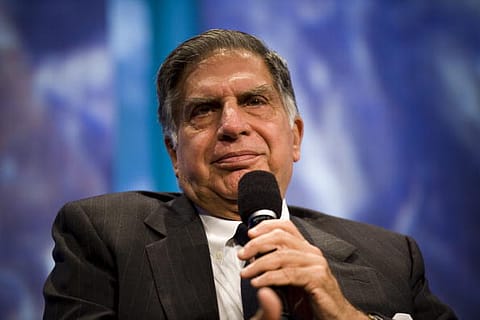We should not go overseas if we are going to disgrace our image: Ratan Tata
In an insightful interaction with Sadhguru in 2014, Tata shared his insights on business ambition, innovation, and self-sufficiency.

In 2014, Ratan Tata sat down with Sadhguru at the Isha Insight workshop to discuss leadership, innovation, and the responsibilities of individuals and corporations alike. The conversation revealed Tata’s profound reflections on India’s role in the global market, the importance of nurturing innovation, and the need to foster self-sufficiency within communities.
Going Global - responsibly
When asked about overseas expansion, Tata emphasised that it should be pursued thoughtfully and with respect for both corporate and national identity. He pointed out that going overseas offers Indian companies a valuable opportunity to engage in competitive global markets and access advanced technologies. Reflecting on the Tata Group's acquisition of British automotive icons Jaguar and Land Rover, he shared that such moves were motivated by more than mere financial gain; they were also about blending cultures and adopting technologies that could enrich operations in India.
This global outlook, however, is rooted in a deep sense of responsibility. Tata believes that while companies should pursue global expansion, they must also remember their role as representatives of their country. “We all need to have a sense of pride in what we do,” Tata said. “We should not go overseas if we are going to disgrace our image, both the corporate and the country’s image. Going overseas provides an opportunity to compete in a more competitive marketplace and brings access to technologies that can be brought back to India. If you can blur the boundaries, the colour of skin, and culture, and merge it into one strong entity, good things are bound to happen,” said Tata.
Systemic excellence & individual genius
Sadhguru raised a critical question about the friction between systemic efficiency and individual creativity, especially as it pertains to large organisations such as the Tata Group. In response, Tata spoke about the role of corporate culture in nurturing innovation. He reflected on the example of Steve Jobs, who transformed Apple by cultivating an environment that valued innovation over conventional practices.
“Innovation has to be the environment that you create around yourself,” Tata explained. “When Steve Jobs returned to Apple, he built what is now one of the most valuable companies in the world by doing things differently. He created an autocratic environment that allowed for innovation.”
Recommended Stories
Tata’s view on innovation is both pragmatic and empowering. He acknowledges that structures and processes are essential for running large organisations efficiently, but they must also allow space for creativity and new ideas. For Tata, innovation is not confined to technology; it also encompasses the way people think and approach challenges, whether in business or social endeavours. This philosophy underscores his belief that companies should foster environments where people are inspired to push boundaries and challenge the status quo.
Fostering Self-sufficiency
Tata’s commitment to social responsibility has always been a cornerstone of his work, particularly through the Tata Trusts, which have invested heavily in community welfare. During the conversation, he expressed his concerns about the dependency that grants and charitable initiatives can sometimes create. He believes that true philanthropy should empower people rather than make them reliant on external support.
“The worst thing you can do is to give everybody a sense of dependability on an outside force, whether it’s the government or a private entity. You have to create sustainability that is self-generated,” Tata stated.
(INR CR)
He illustrated this point by highlighting the need for sustainable development in rural India. He emphasised that charitable efforts should not only provide financial assistance but also foster a sense of ownership and pride within communities. This shift from monetary support to idea generation, he argued, is critical in helping communities become more self-reliant and productive. Tata urged leaders and philanthropists to focus on initiatives that instill self-sufficiency rather than dependency.
Tata discussed how these principles are shaping the Tata Trusts' current initiatives. He admitted that in the past, the Trusts may have been more focused on providing direct assistance to NGOs and rural groups, which, while beneficial in the short term, could lead to long-term dependency. Moving forward, Tata advocated for a new approach focused on empowering communities to sustain themselves.
“As a trust, we have been helping communities and individuals in various ways, but we have ignored the fact that what we are doing may not be sustainable. If we want to replicate our work across different communities, we need to ensure they can thrive independently when we leave,” he explained. “We must become idea-givers rather than money-givers.”
For Tata, sustainable philanthropy means creating systems that enable communities to thrive without perpetual external support. He envisions a model where philanthropy is less about charity and more about capacity-building, encouraging communities to generate their own prosperity. By fostering an entrepreneurial spirit within these communities, he believes they can achieve long-term stability and self-respect.
In essence, Tata’s urged for action by business leaders across sectors to build legacies that extend beyond financial success, embracing the responsibility to inspire, uplift, and empower those they serve.